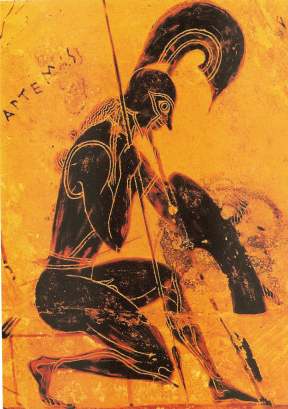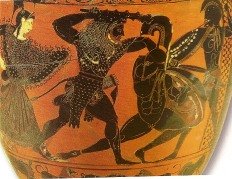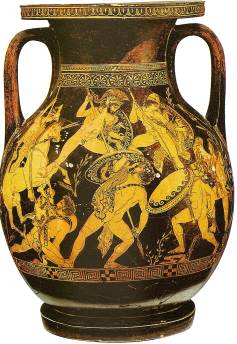Ares, the fearsome Greek God of War
Several ancient literary sources indicate Thrace to be the birthplace of Ares. The myths of Amazons, which were alleged to be his daughters, also suggest he was born in Thrace. For this reason, in Greece he was only worshipped in Boetia and Attica, where Thracian tribes had settled.
Relationships with the rest of the Olympians God's link with the greek judicial system The myth of Oenomaus and Hippodameia
Relationships with the rest of the OlympiansBecause of his inclination towards fights and discord, the war god was not at good terms with any of the Olympians. Even his father, Zeus, often expressed his dislike for his hot tempered son.The god was especially hostile towards Athena, who was also a war deity. During the Trojan War, Ares fought on the side of Trojans, despite his mother Hera's plea to fight on the side of the Greeks. He was wounded by Diomedes, whose hand had been guided by Athena. The two gods finally chose to resolve their differences in the battle that would determine the fate of Troy; in this battle Ares was defeated and wounded by his sister. In the case of Aphrodite, the god of war is mentioned both as husband or lover of the goddess of love. The most notable incident that links the two gods together, is the one according to which Hephaestus, being the legal husband of Aphrodite, was enraged to catch the illegal couple in bed, after being tipped off by Helius. As the story goes, Hephaestus tied them in bed and made them publicly ridiculed, by inviting the rest of the Olympians to watch the embarrasing sight of the two lovers lying together in bed, tied by invisible bonds. Whether husband or a lover, Ares was very jealous of Aphrodite. Unable to bear her lust for young Adonis, he changed himself into a wild boar and killed the handsome youth. [top] Relationships with heroes
Both the fearsome god or his sons were always defeated, whenever they encountered the mighty Hercules whose patron goddess was Athena. One of the god's son, the wild Cycnus, would kill anyone traveling from Thermopylae to Tempe, planning to build a temple in honor of his divine father, using his victims's skulls. When fate crossed their paths, Cycnus, with the aid of his divine father, he immediately attacked Hercules. Following his initial retreat, the mighty hero finally managed to kill wild Cycnus. In another version of the myth, Hercules, who was riding a chariot driven by his faithful aide Iolaus, managed in the standoff with Cycnus, to kill his opponent and also wound Ares, who rushed to his son's aid. Hercules was saved from the god's fury by his protectress, Athena. There are also two other occasions that mighty Hercules and the fearsome god of war crossed their path, indirectly: The first case had to do with the eleventh of the twelve labors of Hercules: Diomedes, the Thracian king who fed his wild mares on human flesh, was actually the son of the god of war. The second case had to do with another of the hero's labors, his fifth labor.:The hideous flesh-eating stymphalian birds which the hero managed to kill with the aid of Athena, were actually raised by the god of war. Another hero that provoked the anger of the god of war, was Cadmus, the legendary founder of the city of Thebes. The god was enraged when the mortal king killed a dragon who was born from the god's union with the nymph Telphusa. To appease the god, Cadmus served as his servant for a year. The two finally came to good terms and as a matter of fact, the god consented to Cadmus's marriage to his daughter Harmonia, that he had with Aphrodite. [top] God's link with the greek judicial systemIn ancient Athens, one very important and very powerful legal and legislative institution was Areopagus (Areios Pagos).In Greek, it actually means "hill or rock of Ares", and refers to both the name of the "ancient council of elders", which usually combined judicial and legislative functions, as well as the site where this council convened. The site itself is a rocky hill, 370 ft (113 m) high, northwest of the Acropolis in Athens. According to ancient sources, there are two stories which link the god of war to the origin of the name of Areopagus: Ares had a daughter named Alcippe, who was, according to myth, raped by Poseidon's son, Halirrothius. To avenge his daughter, the god killed the rapist, but Poseidon appealed to the council of the gods, seeking justice. The court convened on a hillock near the Acropolis of Athens. Ares was declared innocent, but to purify himself from the murder, he was convicted to work as a slave for a year. The hillock was later named Areopagus. According to the other story, Areopagus took its name from the war god's daughters, the Amazons, who encamped on the hillock and made sacrifices to their father, before they launched a campaign to remove Athena from the Acropolis.
[top] The myth of Oenomaus and Hippodameia
A very fascinating myth filled with intrigue and associated with the god of war, is the story of Oenomaus, who was the god's son that he had with Harpina, daughter of the river Asopus: Oenomaus was the king of Pisa, in Elis. Because of an old prophecy which stipulated that he would be killed by his future son in law, he invited all of the suitors for his daughter Hippodameia, to a chariot race starting from the Temple of Zeus in Olympia and finishing at the Temple of Poseidon at Corinth. Because of the fact that his horses, Psylla and Harpina, were godly gifts from his father, he was sure to outrun his competitors. His devious plan was that his charioteer, by the name of Myrtillus and who by the way was the son of Hermes, would, when he approached them, kill one by one all the suitors, thus eliminating the threat on the life of Oenomaus which the dreadful prophecy read. Thirteen suitors had already met their death, when Pelops showed up to take part in the race. Owing to the fact that his horses and golden chariot were gifts from Poseidon,together with the assistance he received from Myrtilus (as explained below), he managed to win the race. Apart from having an advantage over his opponent with regard to the chariot, Pelops came up with a devious scheme to finally kill Oenomaus : He struck a deal with Myrtilus to secretly remove the nails from the king's chariot, thus veering it off course, causing the death of its passenger. As exchange for his aid, Myrtilus was promised from Pelops a night with Hippodameia, should he eventually win the race! As expected, Oenomaus was toppled from his seat in the chariot, tangled in the reins and dragged to his death by his horses, thus fulfiiling the prophecy. Before he died, however, Oenomaus cursed his charioteer to die by the race's winner. His curse later was fulfilled, but the murder of Myrtilus brought a series of disasters on the descendants of Pelops.
[top] Other god's childrenIn addition to Harmonia, Ares fathered two sons with Aphrodite, Deimus and Phobus. Some other writers, also list Eros and Priapus as their children.Deimus and Phobus always appeared together and represented Fear and Panic, respectively. They accompanied their father everywhere and fought by his side. Their demonic form decorated the shields of Agamemnon, Hercules and Achilles. The Spartans paid particular tribute to Phobus, bulding a temple to honor him. They considered him to be protecting their soldiers in battle, calling him to sow panic in their enemies. Among the heroes, Theseus was the one to honor Deimus and Phobus, alleged to offer a sacrifice to them before going to battle with the Amazons . The god of war was also said to have fathered a son in Libya. His name was Lycastus and he had the habit of killing strangers and sacrificing them to his father. He captured the greek hero Diomedes, who landed in Libya on his return trip to Greece after the fall of Troy. Lycastus's daughter Callirhoe fell in love with the prisoner, and persuaded her father to set him free. But, she finally had a tragic end, when she killed herself after realizing that the man she fell in love with, would not reciprocate her affection.
[top] The god's CultThe oldest sanctuary of the god of war was in Thebes, where inhabitants believed they descended from the Spartans, who grew from the teeth of the god's monster son, slain by Cadmus. The city's fortifications were dedicated to the god and named in his honor, Areion.The god's cult was equally strong in Athens. This is evidenced by the fact that Athenians named their criminal court (Areopagus) after the god. In addition, the oath taken by the Athenian youth when they entered manhood, was dedicated to him. The Spartans sacrificed roosters, oxen and dogs to the ancient statue of Enyalios (meaning "in the sea") Ares. In artisitic illustrations, the god, in addition to his sons Deimus and Phobus, was always accompanied in battle with Eris (Discord) and the hounds of Hades, known as Keres. The god's symbols were the spear and the brand. Also, the vulture and the hound were sacred to the god.
Return from Ares to Greek Pantheon
|
||||
Resource MaterialClassroom MaterialMovies,DVDs, Games and BooksAbout the SiteYour Stories |
||||
|
|
||||









